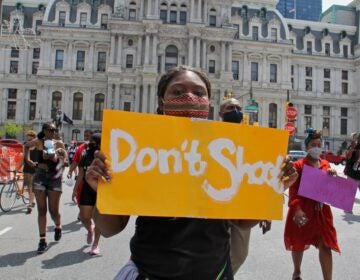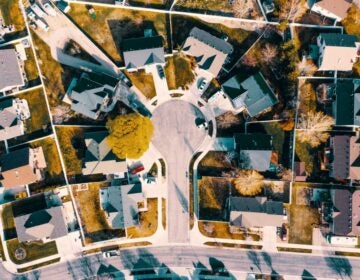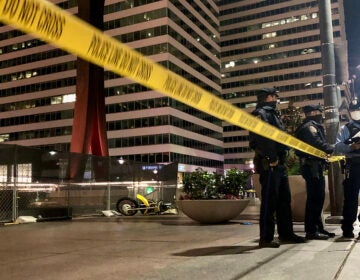2,200 people have been shot in Philly this year. Experts don’t see easy changes ahead
With just days left in December, more than 2,200 people have been shot in Philadelphia, a 53% increase over the same time last year.
Listen 2:07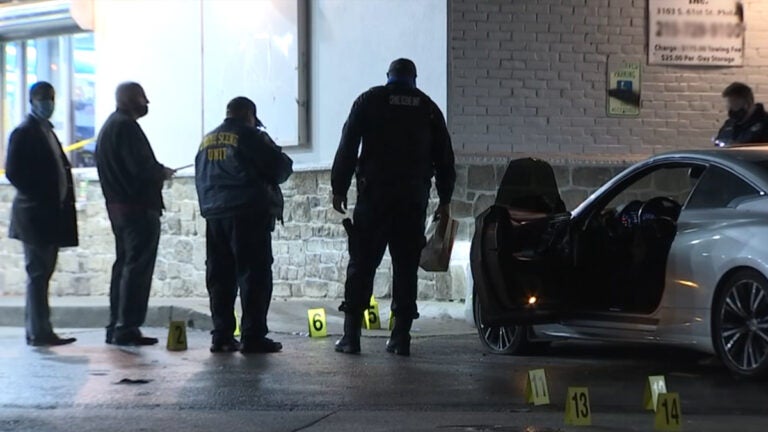
Detectives look at the ground as evidence markers lay on the ground surrounding a vehicle following a fatal carjacking in North Philadelphia. (NBC10)
Deemika Brown doesn’t need a stat sheet to tell her gun violence is surging in the city.
The streets in her section of West Philadelphia are all the evidence she needs.
“The gunshots are daily,” she said. “It’s totally different from before.”
Another tell-tale sign for Brown: a lot more mothers in her neighborhood have joined grief support groups this year, the deadliest for homicides in three decades.
In early December, the 47-year-old added her name to that list after the pain of losing her only son became too much to bear.
Terrell Arnold Jr. was fatally shot in late September after dropping his 3-year-old daughter off at her mother’s house in nearby Upper Darby. Brown said he got a phone call, stepped outside, and was immediately struck.
She got the tragic news after running errands with her husband.
“I was just in disbelief,” said Brown. “I didn’t want to believe that my son was shot.”
The deadly incident is being investigated by the Darby Borough Police Department, but Brown’s broken heart aches more every time she hears another gunshot in Philadelphia.
She suspects that will happen just as frequently next year. Nothing she’s heard or seen since her son’s murder is telling her the level of gun violence seen in 2020 will taper off after the calendar turns.
“I really wish I had an answer because it really needs to stop,” said Brown.
Violence boosted by the pandemic
In March, experts predicted most crime would decrease in Philadelphia during the coronavirus pandemic as a result of stay-at-home orders, as well as ongoing pleas from public health officials for residents to practice physical distancing.
More than nine months later, they say the pandemic undoubtedly drove the dramatic spikes in shootings and homicides this year. And like Brown, they don’t expect much to change after the New Year.
With just days left in December, more than 2,200 people have been shot in Philadelphia, a 53% increase over the same time last year, when Philadelphia recorded more than 1,450 shooting victims.
To date, the Philadelphia Police Department has recorded more than 490 murders. Since 1960, the city has never recorded more than 500 murders in a single year.
Jerry Ratcliffe, a criminal justice professor at Temple University, said many of the factors that likely contributed to those figures, including the economic fallout caused by the pandemic and the city’s high poverty rate, will remain unchanged, at least in the short-term.
“We’ll certainly hope to see it trending downwards a little bit over the winter as we would normally expect to see,” said Ratcliffe.
Anton Moore, anti-violence activist and president of Unity in the Community, doesn’t expect gun violence to decrease until daily life returns to normal, a prospect that public health officials say will likely take several more months given current guidelines for distributing COVID-19 vaccines.
Moore said the pandemic boosted gun violence in the city because there’s been less to deter residents most at-risk of picking up a gun from doing that, especially teenagers. Many extracurricular activities and afterschool programs are suspended. Recreation center gyms are closed. The job market in most sectors is tight or nonexistent.
“Where a kid might be in a gym playing ball with his friends, now he’s sitting there on social media maybe beefing with someone,” he said.
Those virtual beefs, said Moore, can easily translate to gun violence in the real world — and often have over the years.
“There’s only so much you can take away before there are consequences and repercussions,” said Moore.
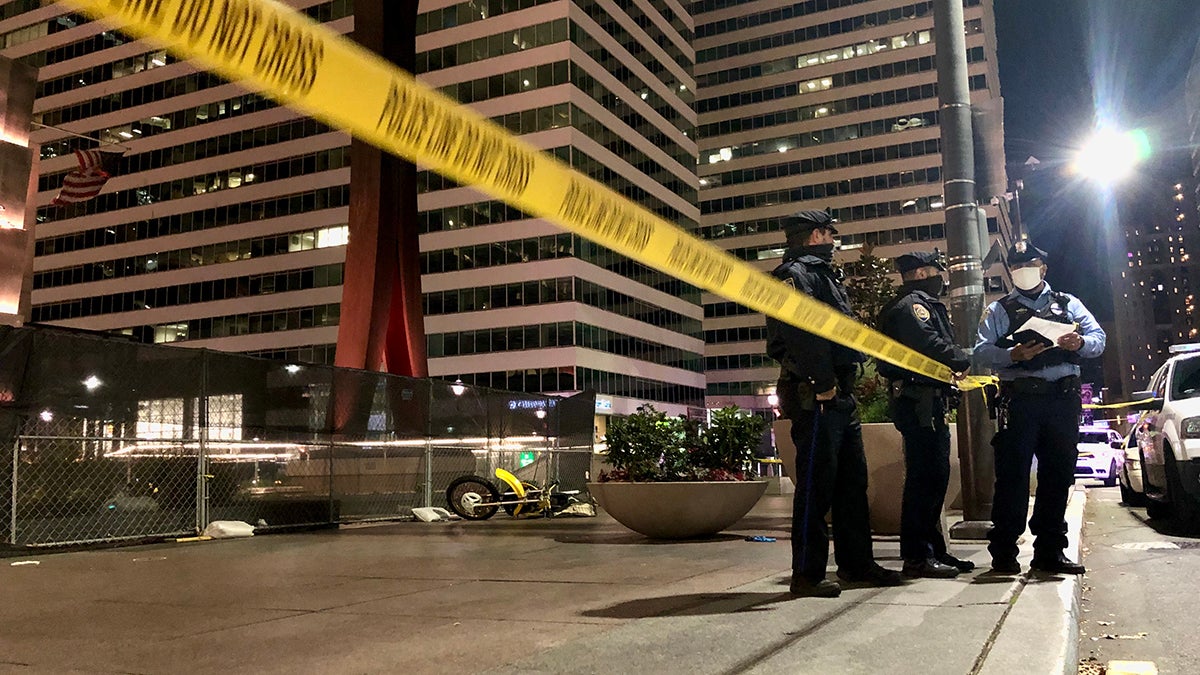
This year’s spike in gun violence is not unique to Philadelphia. Big cities across the country have experienced similar or worse surges, particularly when it comes to homicides.
As of mid-November, New York’s homicide tally was up 38% over the same time last year.
Chicago’s had increased by 53% during the same period.
Jeff Asher, founder of AH Datalytics, a New Orleans-based data analysis company, said there’s no reason to believe the grim trend will suddenly reverse itself, adding the causes are likely bigger than what’s happening on the ground in a particular city, he said.
“There’s a tendency when you talk to police departments, when you talk to mayor’s offices, to say the convenient political thing is the thing that’s driving it,” said Asher. “If that were the case we wouldn’t be seeing this everywhere.”
In Philadelphia, Mayor Jim Kenney’s administration and the police department are not interested in making predictions when it comes to gun violence.
Sgt. Eric Gripp, a spokesperson with the Philadelphia Police Department, said it’s “impossible” to say whether it will remain elevated or decrease next year.
“However, we remain steadfast in our belief that as we continue to implement cultural and operational changes in our department, we will begin to see marked improvement in the amount of violent crime — particularly gun crime — that has plagued our city for years,” said Gripp.
“Real progress cannot happen through the police department alone,” he added. “That is why we will continue to work with our partner agencies — city, state, and federal — along with our precious communities to bring long-lasting change to Philadelphia.
The search for solutions
In early December, the police department and district attorney’s office launched a new initiative designed to secure more convictions for people arrested for gun-related crimes.
A working group will closely examine weekly arrests for non-fatal shootings and illegal gun possession. The primary goal is to proactively identify issues that could make those cases harder to win in court. For example, issues that could lead a judge to suppress — keep out — certain evidence at trial. But stakeholders also say earning more convictions in these cases could help reduce gun violence by taking would-be shooters off the street.
“It doesn’t hurt,” said Philadelphia District Attorney Larry Krasner.
Over the summer, the city launched the Group Violence Intervention program, an effort grounded in a long-standing fact about gun violence in Philadelphia: A small number of the city’s residents are responsible for the shootings — less than half of 1%.
The hope is that singling out some of those individuals, identified with the help of police, will translate to fewer people being rushed to emergency rooms with gunshot wounds.
To date, the city has identified nearly 160 potential participants. All of them are male.
“I’m cautiously optimistic,” said Vanessa Garrett-Harley, deputy managing director of the program. “The message is beginning to get out there and we believe it’s beginning to have some effect.”
GVI, rooted in a crime prevention strategy known as focused deterrence, hinges on a combination of carrots and sticks.
Once a week, a group of program partners hits the streets to offer participants — most of whom are on parole or probation — social services, job training, and mental health services, but also to threaten them with collective enforcement if the violence doesn’t stop.
Traditionally, that has meant group members are responsible for one another’s actions. If the shootings continue, everyone suffers the consequences, which could include higher bail, more restrictive probation conditions, and the possibility of being rearrested on a discharged case.
The city has hired an analyst to evaluate the program and whether it’s helping to reduce gun violence.
___
Find a list of resources for those affected by gun violence here.
___
Editor’s Note: A previous headline of this article suggested shootings “doubled” in 2020. In fact they rose 53%.

Get daily updates from WHYY News!
WHYY is your source for fact-based, in-depth journalism and information. As a nonprofit organization, we rely on financial support from readers like you. Please give today.



